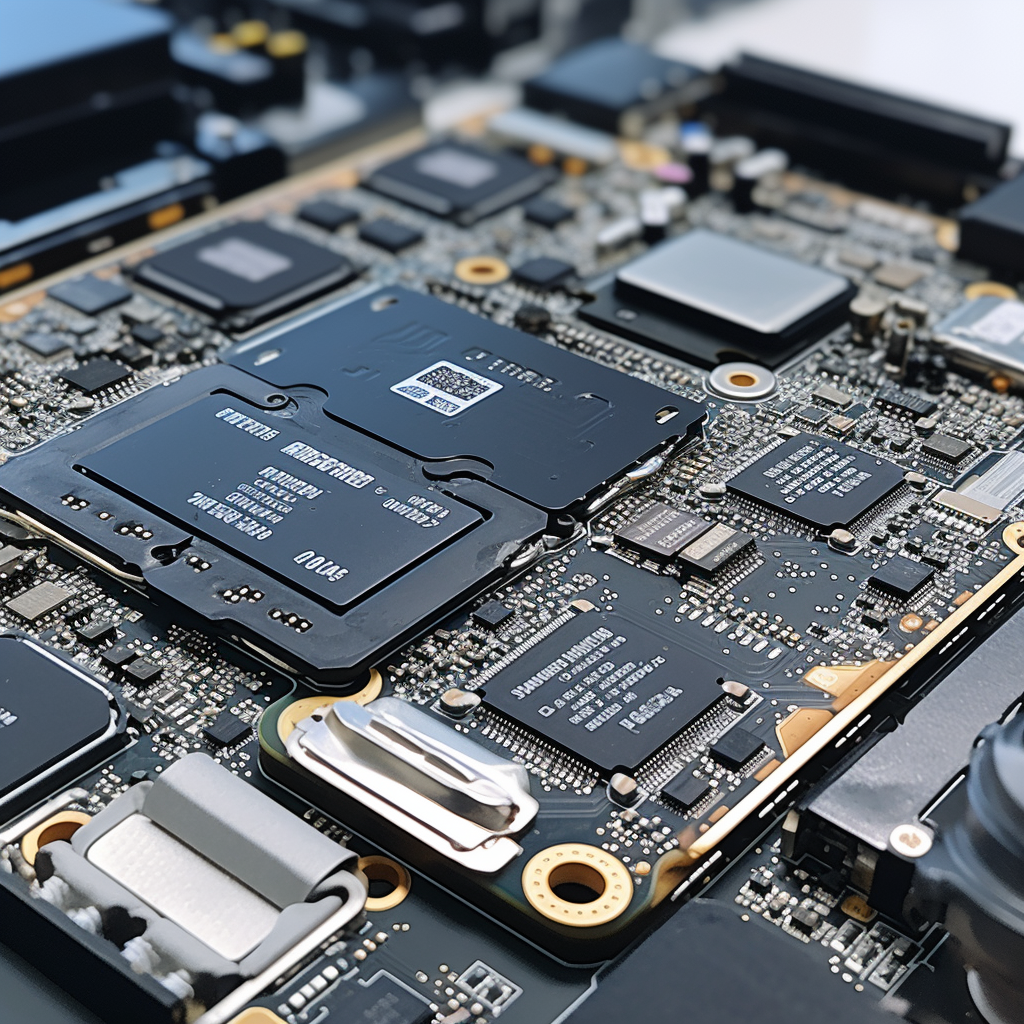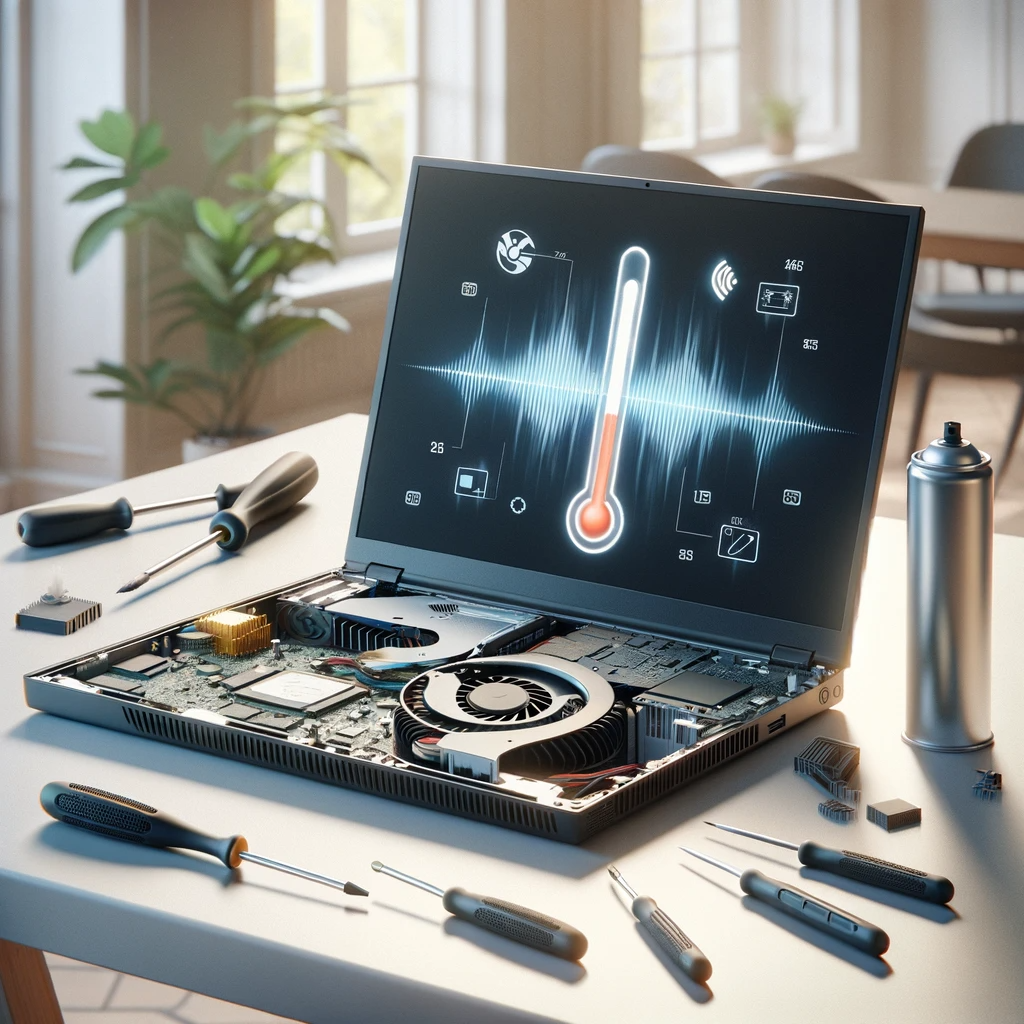Introduction – Why is My Laptop Making Weird Noises?
Hearing odd buzzing, grinding or loud fan noises coming from your laptop? Strange laptop sounds often arise when internal components get obstructed or begin failing. Thankfully, many of these audio issues can be resolved yourself with some DIY troubleshooting.
This comprehensive guide covers everything you need to stop weird noises and restore peace and quiet to your overheating laptop.
You’ll learn:
- Key reasons laptop fans, CPU and hard drives make loud noises and overheat
- Diagnosing buzzing, grinding and whistling sounds
- Simple solutions for common fan and hard drive noise issues
- Hardware and software fixes to stop loud laptop fans
- Cleaning procedures and upgrades to prevent future noise
Plus real-life troubleshooting examples, technical terms explained and frequently asked questions answered. Let’s get started fixing your noisy laptop!
Reasons for Buzzing, Grinding Noises and Overheating

Laptops mainly make noticeable noises when internal hardware components get overworked, blocked or begin deteriorating.
1. Cooling Fans Working Overtime
The internal cooling fan often makes buzzing/grinding noises when spinning rapidly to cool down an overheating CPU or graphics card. Common causes of overheating include:
- Dust obstructing fan blades and vents
- Demanding tasks spiking CPU usage
- Failing thermal paste preventing heat dissipation
- Loose components rubbing on fan blades
If fans can’t ramp up speed to cool rising internal temps, it can permanently damage components. So loud fans are often protecting your laptop!
2. Failing Hard Disk Drives
In older Windows 10 laptops still running traditional mechanical hard drives (HDDs), sudden loud buzzing or grinding noises indicate deteriorating drive components.
As HDD platters and read-heads degrade from wear and tear, disruptions and friction increases audible noises while performance declines.
3. Loose Internal Parts
Intermittent tapping/rattling noises signify loose screws or cables touching spinning fan blades. These repetitive vibrations get transmitted externally as loud noise.
Now let’s explore solutions tailored to these specific laptop noise types.
Quick Fixes for Loud and Noisy Laptop Fans
For moderate fan buzzing or grinding noises, a few convenient at-home solutions may help:
Clean All External and Internal Vents
Use pressurized air to dislodge accumulated dust near external bottom vents and outlets. Then open up the case to access and thoroughly clean internal fan blades, heat sinks and filters.
Lower Computational Load via Windows Task Manager
Excess gaming and video editing can tax components and internal fans working hard to cool them down. Reduce CPU/GPU usage with Quiet Mode or directly limit processor percentages in Task Manager.
Ensure Proper Air Circulation Underneath
Only use laptops on hard flat surfaces. Soft materials can block air intakes. Also avoid stacking papers underneath or crowding work areas to give proper ventilation.
Advanced Troubleshooting for Persistent Noises
For hardware grinding/buzzing noises that continue despite quick fixes, deeper troubleshooting is required:
1. Identify Noise Type and Faulty Component
Figure out if the sound is coming from a specific area like near cooling vents (fans) or hard drive location. Replicate issue to confirm origin.
2. Inspect Internal Fans and Connectors
Use a Phillips screwdriver to safely open up the laptop base and check fan blades and connector cables for obstructions rubbing against assemblies during rotation.
3. Run Hardware Diagnostics Tools
Use built-in Windows tools like Memory Diagnostics and Disk Check to scan RAM sticks and hard drives for emerging failures that contribute to noises before total breakdown.
4. Monitor Component Temperatures
Use system utilities like Open Hardware Monitor and Core Temp to check for excess temperatures triggering louder fans. 85+ degrees Celsius risks damage.
5. Consider Replacing Old Thermal Paste
If overheating continues despite cleaning fans, applying high quality fresh thermal paste between CPUs/GPUs and their heat sink plates restores cooling efficiency to reduce fan speeds and noise over time.
6. Attempt Hardware Upgrades
We’ll cover options like swapping loud mechanical drives for quieter and less failure-prone solid state drives next.
Hardware Upgrades To Stop Noises Long-Term
Besides cleaning and diagnostics, upgrading selective laptop hardware also eliminates noises permanently:
Use Quiet Solid State Drives
Contain no moving parts unlike mechanical hard drives. Silent flash memory operation runs cooler with less vibration and failure risk.
Add More/Faster Internal Cooling Fans
For persistent overheating, upgrading case fans to higher CFM models or adding secondary fan modules maintains lower component temperatures to reduce noise from existing fans struggling vainly.
Attach External USB Cooling Pads
Clip-on pads with built-in high RPM fans enhance overall airflow and ventilation to supplement existing cooling. Lowers need for noisy internal fan usage.
Now let’s tackle noise triggers stemming from software misconfigurations.
Fix Software Issues Causing Excess Noise
Besides hardware faults, poorly optimized software also overworks components, raising temperatures and fan speeds:
Clean Up Background Processes and Tasks
Bloatware, syncing software and helper programs hog resources. Use Task Manager regularly to limit activity only to essential services and apps.
Uninstall Unnecessary Software
Get rid of unused video editors, duplicate apps and trialware using the Windows 10 Settings app manager to lighten resource consumption.
Run Efficient Anti-Malware Tools
Malware and crypto mining programs can hijack CPU/GPU cycles, overheating components with loud fans attempting to provide cooling. Use reputed layered antivirus softwares.
Keep OS and Apps Updated
Outdated Windows and software lacks optimization, risking crashes, instability and overheating. Enable automatic updates where possible.
Replace Old Hard Drives Old mechanical hard drives with deteriorating physical components generate noise and heat due to rising mechanical resistance. Solid state drives with no moving parts eliminate this.
Preventative Maintenance To Stop Future Noises
Alongside fixing current noises, smart maintenance routines prevent future laptop fan and hard drive issues:
Clean External and Internal Components Yearly
Use pressurized air to remove dust near external vents. Open up case to clean accumulated debris from internal fans using cotton swabs soaked in isopropyl alcohol. Replacing thermal paste yearly also maintains cooling performance.
Always Update Firmware and Components
Ensure BIOS, drivers like GPU, chipset and storage are updated. Update any hardware management, tuning and diagnostic software too.
Handle With Care
Avoid putting pressure on laptop body, tossing bags around or piling heavy objects that can loosen screws, cables and connectors leading to internal rattling from parts touching fans.
Common Laptop Noise Questions Answered
Q. Why is my laptop fan suddenly so loud even without intensive usage?
A. Fans often abruptly get louder to compensate for a clogged/obstructed ventilation system. Make sure external and internal vents, filters and fans are not coated with thick dust. Replacing worn out thermal paste between CPU and cooling systems also reduces overheating.
Q. What is the buzzing noise coming from my laptop?
A. Buzzing generally arises from a fan working overtime due to excess heat. Distinguish exact location and inspect fans for obstructions. Excess dust, workloads, failing thermal paste or background processes can create spikes needing urgent cooling.
Have any other questions on resolving laptop grinding, loud fan buzzing or whistling? Ask in the comments!

